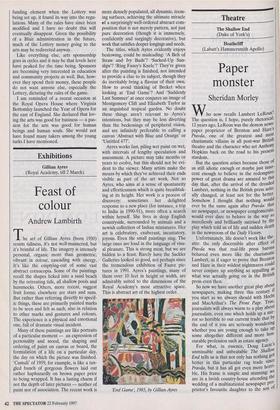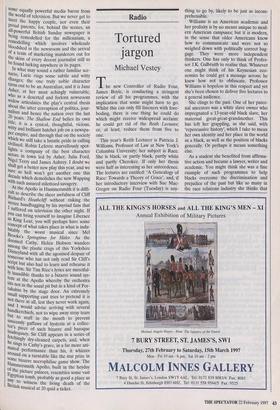Theatre
The Shallow End (Duke of York's) Heathcliff (Labatt's Hammersmith Apollo)
Paper monster
Sheridan Morley
Who now recalls Lambert LeRoux? The question is, I hope, purely rhetorical; 12 years ago, LeRoux was the demon news- paper proprietor of Brenton and Hare's Pravda, one of the greatest and most charismatic villains in all post-war British theatre and the character who set Anthony Hopkins back on the road to his present stardom. But the question arises because those of us still idiotic enough or maybe just inn& cent enough to believe in the redemptive power of great drama are amazed to this day that, after the arrival of the dreaded Lambert, nothing in the British press actu- ally changed, at least not for the better. Somehow I thought that nothing would ever be the same again after Pravda: that no newspaper, or newspaper conglomerate, would ever dare to behave in the way so mercilessly and brilliantly satirised by the play which told us of life and sudden death in the newsroom of the Daily Victory. Unfortunately, life doesn't work like the- atre: the only discernible after effect of Pravda was that real-life press barons behaved even more like the charismatic Lambert, as if eager to prove that Brenton and Hare in their wildest nightmares could never conjure up anything so appalling ,as what was actually going on in the British press even then. So now we have another great play about newspapers, making three this century if you start as we always should with Hecht and MacArthur's The Front Page. True, journalists will always warm to a play about journalists, even one which holds up a nut- ror so horrible to our current trade that by the end of it you are seriously wondering whether you are young enough to take 12P some altogether different and more hon- ourable profession such as estate agency.. , For what, in essence, Doug Lucie s unmissable and unbeatable The Shallow End tells us is that not only has nothing got better in this particular rag trade since Pravda, but it has all got even more horri- ble. His frame is simple and stunning: we are in a lavish country-house attending the wedding of a multinational newspaper pro; prietor's favourite daughter to the son el some equally powerful media baron from the world of television. But we never get to Meet the happy couple, nor even their proud parents; for, behind the scenes, an all-powerful British Sunday newspaper is being remodelled for the millennium, a remodelling which involves wholesale bloodshed in the newsroom and the arrival of a team of marketing murderers out for the skins of every decent journalist still to be found lurking anywhere in its pages. In what may sound a rather familiar sce- nario, Lucie rings some subtle and witty changes; , the one truly noble character turns out to be an Australian, and it is Jane Asher, at her most achingly vulnerable, who as a deserted and forlorn newsroom Widow articulates the play's central thesis about the utter corruption of politics, jour- nalism and hence the nation over the last 20 years. The Shallow End belies its own title; it is a cynical, thoughtful, vicious, witty and brilliant hatchet job on a newspa- per empire, and through that on the society which we still take a lunatic pride in calling civilised. Robin Lefevre marvellously spot- lights a company of the best character actors in town led by Asher, Julia Ford, Nigel Terry and James Aubrey. I doubt we shall get a better new play this year, and we sure as hell won't get another one this decade which demolishes the new Wapping with such assured stilettoed savagery. At the Apollo in Hammersmith it is diffi- cult to describe the sheer awfulness of Cliff Richard's Heathchff without risking the severe handbagging by his myriad fans that I suffered on television the other night. If You can bring yourself to imagine Liberace as King Lear, you will perhaps have some concept of what takes place in what is indu- bitably the worst musical since Mel Brooks's Springtime for Hitler. As the doomed Cathy, Helen Hobson wanders among the plastic crags of this Yorkshire Disneyland with all the agonised despair of someone who has not only read Sir Cliff's script but also had to learn and rehearse it with him. Sir Tim Rice's lyrics are merciful- ly inaudible thanks to a bizarre sound sys- tem at the Apollo whereby the orchestra sits not in the usual pit but in a kind of Por- takabln by the stage door. An extremely small supporting cast tries to pretend it is not there at all, lest they never work again, and I would advise arriving with several handkerchiefs, not to wipe away stray tears but to stuff in the mouth to prevent unseemly guffaws of hysteria at a collec- tor's piece of such bizarre and baroque inadequacy. Sir Cliff appears in a series of fetchingly dry-cleaned carpets, and, when he sings to Cathy's grave, in a far more ani- mated performance than his, it whizzes around on a turntable like the star prize in some bizarre necrophiliac game show. The Hammersmith Apollo, built in the heyday (,),f the. picture palaces, resembles some vast tgVphan tomb, probably as good a place as any to witness the living death of the British musical at 20 quid a ticket.



























































 Previous page
Previous page